Unit 2 How do you come to school Story time 课件(共27张PPT)
文档属性
| 名称 | Unit 2 How do you come to school Story time 课件(共27张PPT) |  | |
| 格式 | pptx | ||
| 文件大小 | 21.4MB | ||
| 资源类型 | 教案 | ||
| 版本资源 | 牛津译林版 | ||
| 科目 | 英语 | ||
| 更新时间 | 2021-02-24 08:40:09 | ||
图片预览

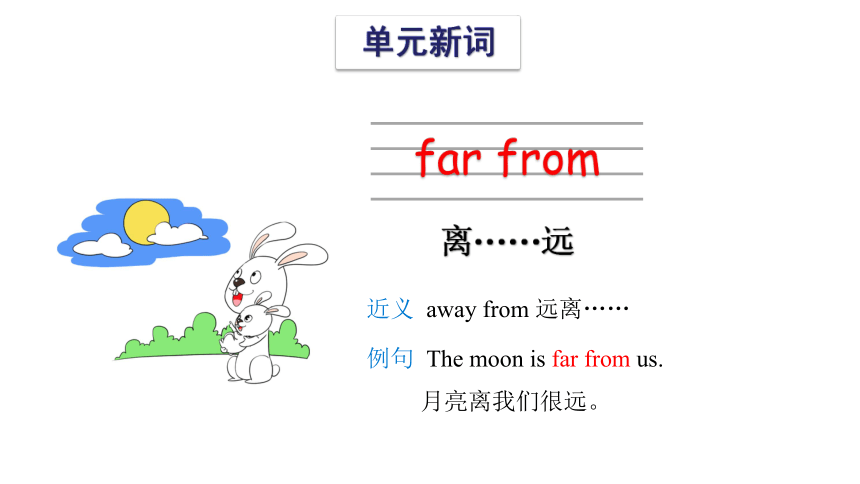


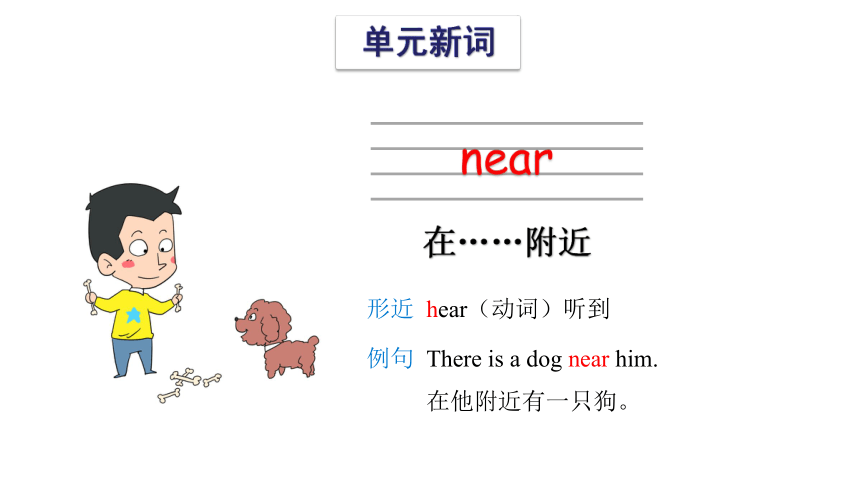
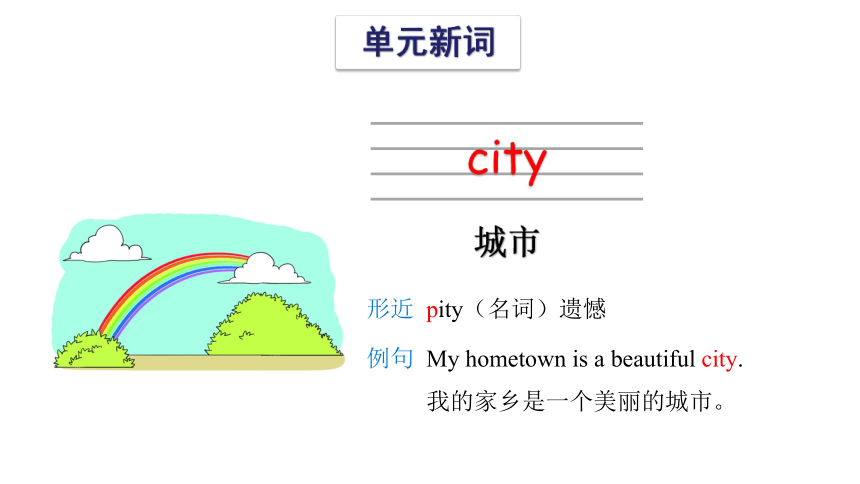
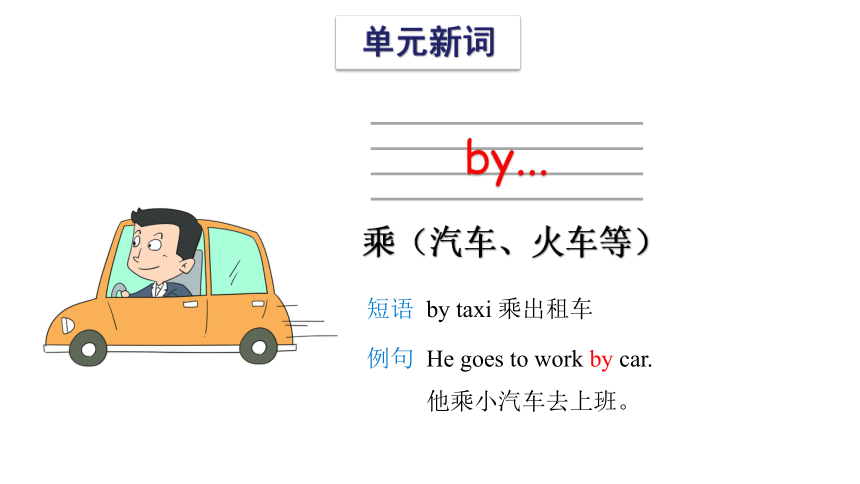
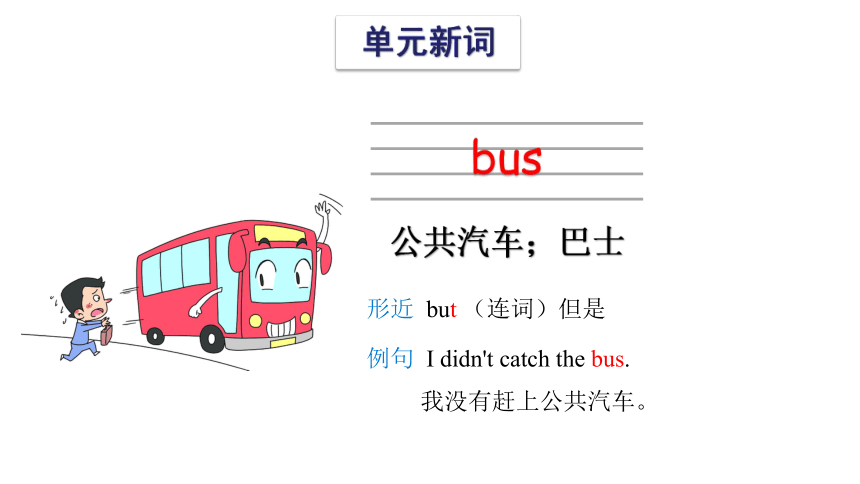
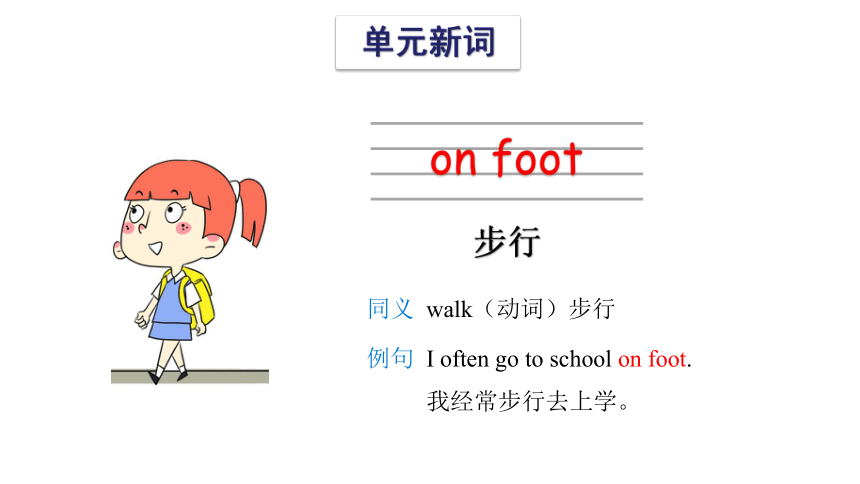
文档简介
Unit 2 How do you come to school?
Story time
…………………………………
far from
离……远
近义 away from 远离……
例句 The moon is far from us.
月亮离我们很远。
单元新词
moon
月亮
形近 noon(名词)中午
例句 I can see the moon in the sky.
我能看见天上的月亮。
单元新词
street
街,街道
短语 in/on the street 在街上
例句 There are many people in the street.
在街上有许多人。
单元新词
near
在……附近
形近 hear(动词)听到
例句 There is a dog near him.
在他附近有一只狗。
单元新词
city
城市
形近 pity(名词)遗憾
例句 My hometown is a beautiful city.
我的家乡是一个美丽的城市。
单元新词
by...
乘(汽车、火车等)
短语 by taxi 乘出租车
例句 He goes to work by car.
他乘小汽车去上班。
单元新词
bus
公共汽车;巴士
形近 but (连词)但是
例句 I didn't catch the bus.
我没有赶上公共汽车。
单元新词
on foot
步行
同义 walk(动词)步行
例句 I often go to school on foot.
我经常步行去上学。
单元新词
metro
地铁
短语 by metro 乘地铁
例句 Kate goes to the park by metro.
凯特乘坐地铁去公园。
单元新词
taxi
出租车,的士
短语 a taxi driver 一名出租车司机
例句 You can call a taxi to the zoo.
你可以叫辆出租车去动物园。
单元新词
bike
自行车
形近 like(动词)喜欢
例句 He is riding a bike in the park.
他正在公园里骑自行车。
单元新词
plane
飞机
短语 by plane=take a plane 乘飞机
例句 I want to take a plane to London.
我想乘飞机去伦敦。
单元新词
ship
轮船
形近 shop(名词)商店
例句 A ship is big; a boat is small.
轮船很大,(小)船很小。
单元新词
train
火车
形近 rain(名词)雨
例句 The train runs very fast.
火车行驶的速度很快。
单元新词
单元新知
Story time
Yang Ling: Do you like your new home, Su Hai?
Su Hai: Yes! It's very big. I like it very
much, but it's far from school.
Yang Ling: Where do you live now?
Su Hai: I live on Moon Street, near City Library.
Yang Ling: How do you come to school?
Su Hai: Su Yang and I come to school by bus.
1
Story time
Mike: Where do you live, Yang Ling? How do
you come to school?
Yang Ling: I live near school. I come to school on
foot. Where do you live?
Mike: I live in Sunshine Town. I come to
school by metro. What about you, Liu
Tao?
Liu Tao: I live on Park Street. I come to school
by taxi. My father is a taxi driver.
2
Story time
a bike
a bus
a plane
a ship
Story time
a taxi
a train
metro
知识讲解
—Where do you live now? 你现在住在哪里?
—I live on Moon Street, near City Library.
我住在城市图书馆附近的月亮街。
1
析:句型“ Where+do/does+主语+live(+其他)?”是由where 引导的特殊疑问句,常用于询问对方或他人住在什么地方,where意为“在哪里”,其答语为“主语+live/lives in/on/near/far from+地点.”。
例: —Where do you live? 你住在哪里?
—I live in Beijing. 我住在北京。
知识讲解
—How do you come to school?你怎么来学校?
—Su Yang and I come to school by bus.
我和苏洋乘公共汽车来学校。
2
析:(1)询问对方的出行方式可以用句型“ How do you come( to )+地点?”。 how为副词,意为“怎么;如何”,常用来引导特殊疑问句,询问做某事的方式;do是助动词,帮助构成疑问句,无实际意义。
例: How do you come to Shanghai?你怎么来上海?
知识讲解
(2) “ by+交通工具”表示“乘/骑……”。by与表示交通工具的名词连用时,表示交通工具的名词只能用单数形式,且前面不能有修饰词。
常见的出行方式有:
by train 乘火车 by car 乘小汽车
by bus 乘公共汽车 by bike 骑自行车
by plane 乘飞机 by taxi 乘出租车
拓展 表示“乘坐某种交通工具”还可以用“take a/an+交通工具”,与“by+交通工具”表达的意思相同。
Match and say
1
2
3
4
1
2
4
a
b
d
c
Yang Ling comes to school...
Read and circle
Su Hai and Su Yang live near/far from school.
They come to school by bus.
Yang Ling lives near/far from school.
She comes to school on foot.
Mike lives in Sunshine Town/near City Library.
He comes to school by metro.
Liu Tao lives on Moon Street/Park Street.
He comes to school by taxi.
1
2
3
4
课时小结
moon
重点单词
street
near
city
1. —Where do you live now? —I live on Moon Street, near City Library.
重点句子
by
bus
metro
taxi
bike
plane
2. —How do you come to school?—Su Yang and I come to school by bus.
far from
on foot
重点短语
ship
train
课后作业
1. 掌握本课学习的单词、短语和句型。
2. 熟读课文,与同桌谈论一下你们平时是怎样去
上学的。
Story time
…………………………………
far from
离……远
近义 away from 远离……
例句 The moon is far from us.
月亮离我们很远。
单元新词
moon
月亮
形近 noon(名词)中午
例句 I can see the moon in the sky.
我能看见天上的月亮。
单元新词
street
街,街道
短语 in/on the street 在街上
例句 There are many people in the street.
在街上有许多人。
单元新词
near
在……附近
形近 hear(动词)听到
例句 There is a dog near him.
在他附近有一只狗。
单元新词
city
城市
形近 pity(名词)遗憾
例句 My hometown is a beautiful city.
我的家乡是一个美丽的城市。
单元新词
by...
乘(汽车、火车等)
短语 by taxi 乘出租车
例句 He goes to work by car.
他乘小汽车去上班。
单元新词
bus
公共汽车;巴士
形近 but (连词)但是
例句 I didn't catch the bus.
我没有赶上公共汽车。
单元新词
on foot
步行
同义 walk(动词)步行
例句 I often go to school on foot.
我经常步行去上学。
单元新词
metro
地铁
短语 by metro 乘地铁
例句 Kate goes to the park by metro.
凯特乘坐地铁去公园。
单元新词
taxi
出租车,的士
短语 a taxi driver 一名出租车司机
例句 You can call a taxi to the zoo.
你可以叫辆出租车去动物园。
单元新词
bike
自行车
形近 like(动词)喜欢
例句 He is riding a bike in the park.
他正在公园里骑自行车。
单元新词
plane
飞机
短语 by plane=take a plane 乘飞机
例句 I want to take a plane to London.
我想乘飞机去伦敦。
单元新词
ship
轮船
形近 shop(名词)商店
例句 A ship is big; a boat is small.
轮船很大,(小)船很小。
单元新词
train
火车
形近 rain(名词)雨
例句 The train runs very fast.
火车行驶的速度很快。
单元新词
单元新知
Story time
Yang Ling: Do you like your new home, Su Hai?
Su Hai: Yes! It's very big. I like it very
much, but it's far from school.
Yang Ling: Where do you live now?
Su Hai: I live on Moon Street, near City Library.
Yang Ling: How do you come to school?
Su Hai: Su Yang and I come to school by bus.
1
Story time
Mike: Where do you live, Yang Ling? How do
you come to school?
Yang Ling: I live near school. I come to school on
foot. Where do you live?
Mike: I live in Sunshine Town. I come to
school by metro. What about you, Liu
Tao?
Liu Tao: I live on Park Street. I come to school
by taxi. My father is a taxi driver.
2
Story time
a bike
a bus
a plane
a ship
Story time
a taxi
a train
metro
知识讲解
—Where do you live now? 你现在住在哪里?
—I live on Moon Street, near City Library.
我住在城市图书馆附近的月亮街。
1
析:句型“ Where+do/does+主语+live(+其他)?”是由where 引导的特殊疑问句,常用于询问对方或他人住在什么地方,where意为“在哪里”,其答语为“主语+live/lives in/on/near/far from+地点.”。
例: —Where do you live? 你住在哪里?
—I live in Beijing. 我住在北京。
知识讲解
—How do you come to school?你怎么来学校?
—Su Yang and I come to school by bus.
我和苏洋乘公共汽车来学校。
2
析:(1)询问对方的出行方式可以用句型“ How do you come( to )+地点?”。 how为副词,意为“怎么;如何”,常用来引导特殊疑问句,询问做某事的方式;do是助动词,帮助构成疑问句,无实际意义。
例: How do you come to Shanghai?你怎么来上海?
知识讲解
(2) “ by+交通工具”表示“乘/骑……”。by与表示交通工具的名词连用时,表示交通工具的名词只能用单数形式,且前面不能有修饰词。
常见的出行方式有:
by train 乘火车 by car 乘小汽车
by bus 乘公共汽车 by bike 骑自行车
by plane 乘飞机 by taxi 乘出租车
拓展 表示“乘坐某种交通工具”还可以用“take a/an+交通工具”,与“by+交通工具”表达的意思相同。
Match and say
1
2
3
4
1
2
4
a
b
d
c
Yang Ling comes to school...
Read and circle
Su Hai and Su Yang live near/far from school.
They come to school by bus.
Yang Ling lives near/far from school.
She comes to school on foot.
Mike lives in Sunshine Town/near City Library.
He comes to school by metro.
Liu Tao lives on Moon Street/Park Street.
He comes to school by taxi.
1
2
3
4
课时小结
moon
重点单词
street
near
city
1. —Where do you live now? —I live on Moon Street, near City Library.
重点句子
by
bus
metro
taxi
bike
plane
2. —How do you come to school?—Su Yang and I come to school by bus.
far from
on foot
重点短语
ship
train
课后作业
1. 掌握本课学习的单词、短语和句型。
2. 熟读课文,与同桌谈论一下你们平时是怎样去
上学的。
